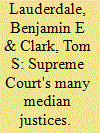| Srl | Item |
| 1 |
ID:
085450


|
|
|
|
|
| Publication |
2008.
|
| Summary/Abstract |
The actual impact of judicial decisions often depends on the behavior of executive and legislative bodies that implement the rulings. Consequently, when a court hears a case involving the interests of those controlling the executive and legislative institutions, those interests can threaten to obstruct the court's intended outcome. In this paper, we evaluate whether and to what extent such constraints shape judicial rulings. Specifically, we examine how threats of noncompliance and legislative override influence decisions by the European Court of Justice (ECJ). Based on a statistical analysis of a novel dataset of ECJ rulings, we find that the preferences of member-state governments-whose interests are central to threats of noncompliance and override-have a systematic and substantively important impact on ECJ decisions
|
|
|
|
|
|
|
|
|
|
|
|
|
|
|
|
| 2 |
ID:
118976


|
|
|
|
|
| Publication |
2012.
|
| Summary/Abstract |
One-dimensional spatial models have come to inform much theorizing and research on the U.S. Supreme Court. However, we argue that judicial preferences vary considerably across areas of the law, and that limitations in our ability to measure those preferences have constrained the set of questions scholars pursue. We introduce a new approach, which makes use of information about substantive similarity among cases, to estimate judicial preferences that vary across substantive legal issues and over time. We show that a model allowing preferences to vary over substantive issues as well as over time is a significantly better predictor of judicial behavior than one that only allows preferences to vary over time. We find that judicial preferences are not reducible to simple left-right ideology and, as a consequence, there is substantial variation in the identity of the median justice across areas of the law during all periods of the modern court. These results suggest a need to reconsider empirical and theoretical research that hinges on the existence of a single pivotal median justice.
|
|
|
|
|
|
|
|
|
|
|
|
|
|
|
|